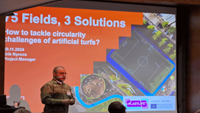The annual seminar of the PlastLIFE project, organized by the Finnish Environment Institute (Syke), focused on plastic reuse, artificial turf recycling, and corporate sustainability challenges. The seminar provided concrete examples and new tools to promote sustainable circular economy models of plastics in Finland.
Prioritizing reuse – is the end of the trow-away culture in sight?

Olli Sahimaa at Sweco, shade a light on reuse in the Nordics. © Johanna Kaunisto
The seminar emphasized the importance of reuse as a means to reduce plastic waste, resource consumption, and emissions that accelerate climate change. Syke presented practical recommendations from discussions with dozens of experts, aiming to make reuse a norm in daily life and business. The focus is on reusable packaging and plastic products, supported by EU targets for the coming years.
Greener artificial turf – new solutions for recycling

Erik Nyroos, City of Helsinki. © Johanna Kaunisto
The seminar highlighted the challenges of recycling artificial turf and their microplastic s emissions. In the PlastLIFE project, the City of Helsinki is developing new ways to procure best solutions for further processing of discarded turfs, utilizing a dynamic procurement system, testing corn cob granules as infill, and experimenting with infill-free turf. The Finnish Environment Institute is studying the additives in artificial turf plastics and their impact on recycling, while LUT University is examining the lifecycle environmental impacts of various recycling options. The goal is to reduce microplastic emissions, avoid recycling of harmful substances with materials, and find sustainable solutions for sports facility construction.
New tool for businesses – ecosystems to address sustainability issues
Aalto University has developed an ecosystem tool to guide businesses in leveraging partnerships and finding new ways to recycle agricultural plastics, and other circular economy solutions. The tool helps in identifying sustainable circular economy actions that can be incentivized through partners like wholesalers. Smaller companies can also use it to implement sustainable production processes through collaboration.
Towards a more sustainable plastic economy
Participants praised the seminar for its concrete solutions and informed lively discussions. “The PlastLIFE project opens doors to the future of the plastic circular economy,” said Helena Dahlbo, project leader at the Finnish Environment Institute Syke, emphasizing the importance of continuing dialogue and development work among various stakeholders. The PlastLIFE project continues its work in many areas, with Syke believing that collaboration and innovative solutions are key to a sustainable plastic circular economy.

The PlastLIFE Annual Seminar brought together experts, companies, and policymakers, both onsite and online, to discuss solutions for the circular economy of plastics. © Johanna Kaunisto
PlastLIFE, co-funded by the EU LIFE Programme and coordinated by the Finnish Environment Institute (Syke), is a nationwide collaboration involving 17 stakeholders. Over the course of seven years, PlastLIFE project promotes the implementation of the Plastics Roadmap for Finland aiming to reduce littering and unnecessary consumption of plastic, to increase recycling and to replace fossil raw material in plastic manufacturing.
Recording
Presentations:
Session 1: Artificial turfs
-
75 Fields, 3 Solutions: How to tackle circularity challenges of artificial turfs, Erik Nyroos, City of Helsinki (pdf)
- Environmental impact assesment of artificial turf at its end of life, Amirsohrab Falsafi, LUT University (presentation not available for public consumption, you can inquire use from LUT (firstname.lastname@lut.fi))
-
Finnish Environment Institutes work on artificial turfs, Päivi Fjäder and Salla Selonen, Finnish Environment Institute (pdf)
-
Commentary, Ilkka Räsänen, City of Lappeenranta (pdf)
Session 2: Lengthening the lifetime of products and reducing waste
Session 3: Product and business development
Learn more
Research Project's recommendations for Reuse (in Finnish)
Ecosystem Toolkit
More information
Coordinator Waltteri Heikkilä, Finnish Environment Institute, firstname.lastname@syke.fi
Project Manager Helena Dahlbo, Finnish Environment Institute, firstname.lastname@syke.fi